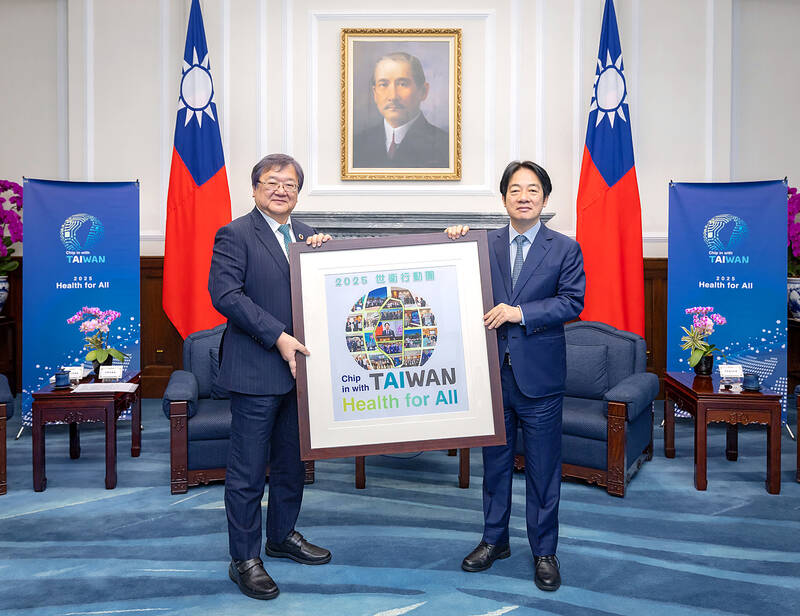Taiwan would not give up its efforts to join the WHO and its annual World Health Assembly (WHA), despite the US’ decision to withdraw from the organization, President William Lai (賴清德) said yesterday.
Lai made the remarks while meeting with members of the WHA Action Team — a government delegation led by Minister of Health and Welfare Chiu Tai-yuan (邱泰源) — at the Presidential Office.
The team traveled to Geneva, Switzerland, to seek participation in the WHA and to demonstrate Taiwan’s healthcare capabilities on the international stage.

Photo courtesy of the Presidential Office via CNA
The 78th WHA, which is being held in Geneva, began on Monday and is to end on Tuesday.
However, Taiwan did not receive an invitation for the ninth consecutive year, due to objections from China.
The WHA Action Team departed for Geneva on May 16 to protest the exclusion and reaffirm Taiwan’s willingness to contribute to global health.
Lai yesterday welcomed the team back to Taiwan and expressed gratitude to the health professionals, civic groups, overseas Taiwanese and lawmakers who joined the delegation to advocate for Taiwan’s right to health.
“It is regrettable that Taiwan was once again excluded from this year’s WHA, and even though the [central government’s] budget has been significantly cut, it did not change our determination to strive for Taiwan’s healthcare human rights,” Lai said.
“Leave no one behind” is a principle promoted by the WHO, but it is a pity that it has left the 23 million people in Taiwan behind, he said.
Despite not receiving an invitation, the action team participated in more than 40 bilateral meetings, professional forums and international news conferences on the sidelines of the WHA, demonstrating Taiwan’s determination to care for its people’s right to health, and to participate in and contribute to global health, he added.
Taiwan is grateful to its diplomatic allies for speaking in support of its inclusion in the WHA, as well as to like-minded countries that have depressed support, either directly or indirectly, Lai said.
Although Taiwan is not a WHO member and was not invited to this year’s WHA, Lai said the nation shares the values embodied in this year’s WHA theme, “One World for Health,” and would continue to promote it.
“Despite being unable to attend [the WHA] this year, we will not give up,” he said, adding that amid budget constraints and the US’ withdrawal from the WHO, Taiwan would continue its efforts to pursue participation in the WHO and WHA to uphold the health rights of its 23 million people and contribute to global health and well-being.
Separately yesterday, Chiu told a news conference that while the size of this year’s WHA Action Team was reduced by one-third due to budget cuts imposed by the Legislative Yuan, the delegation still achieved meaningful results.
Chiu said a record number of participants attended an international news conference on May 18, with representatives from 27 diplomatic allies and like-minded countries voicing support for Taiwan’s inclusion in the WHA.
The delegation also had the opportunity to engage in in-depth discussions with various groups during bilateral meetings, he said.
The Ministry of Health and Welfare signed two memorandums of understanding — one with the International Hospital Federation to promote sustainable development and green hospitals, and another with Geneva University Hospitals to enhance emergency medical cooperation, he added.

A Ministry of Foreign Affairs official yesterday said that a delegation that visited China for an APEC meeting did not receive any kind of treatment that downgraded Taiwan’s sovereignty. Department of International Organizations Director-General Jonathan Sun (孫儉元) said that he and a group of ministry officials visited Shenzhen, China, to attend the APEC Informal Senior Officials’ Meeting last month. The trip went “smoothly and safely” for all Taiwanese delegates, as the Chinese side arranged the trip in accordance with long-standing practices, Sun said at the ministry’s weekly briefing. The Taiwanese group did not encounter any political suppression, he said. Sun made the remarks when

The Taiwanese passport ranked 33rd in a global listing of passports by convenience this month, rising three places from last month’s ranking, but matching its position in January last year. The Henley Passport Index, an international ranking of passports by the number of designations its holder can travel to without a visa, showed that the Taiwan passport enables holders to travel to 139 countries and territories without a visa. Singapore’s passport was ranked the most powerful with visa-free access to 192 destinations out of 227, according to the index published on Tuesday by UK-based migration investment consultancy firm Henley and Partners. Japan’s and

BROAD AGREEMENT: The two are nearing a trade deal to reduce Taiwan’s tariff to 15% and a commitment for TSMC to build five more fabs, a ‘New York Times’ report said Taiwan and the US have reached a broad consensus on a trade deal, the Executive Yuan’s Office of Trade Negotiations said yesterday, after a report said that Washington is set to reduce Taiwan’s tariff rate to 15 percent. The New York Times on Monday reported that the two nations are nearing a trade deal to reduce Taiwan’s tariff rate to 15 percent and commit Taiwan Semiconductor Manufacturing Co (TSMC, 台積電) to building at least five more facilities in the US. “The agreement, which has been under negotiation for months, is being legally scrubbed and could be announced this month,” the paper said,

Japan and the Philippines yesterday signed a defense pact that would allow the tax-free provision of ammunition, fuel, food and other necessities when their forces stage joint training to boost deterrence against China’s growing aggression in the region and to bolster their preparation for natural disasters. Japan has faced increasing political, trade and security tensions with China, which was angered by Japanese Prime Minister Sanae Takaichi’s remark that a Chinese attack on Taiwan would be a survival-threatening situation for Japan, triggering a military response. Japan and the Philippines have also had separate territorial conflicts with Beijing in the East and South China